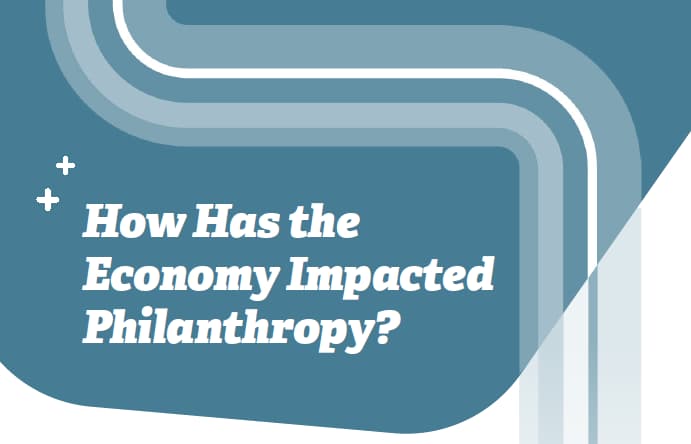In March of 2023, Qgiv surveyed over 290 nonprofit fundraisers and more than 2,000 donors to learn how fundraising professionals can realistically raise more for their organization with fewer resources. In the last three years, fundraisers have faced additional challenges such as the Great Resignation shaking up nonprofit teams, individual donor numbers declining, and *economic instability impacting donor giving habits.
The current state of the economy in the United States has impacted so many aspects of daily life, from the struggles that come with buying a new home to rebudgeting for the impacts of inflation. Nonprofits and the donors that support their crucial missions are no different.

Fundraiser Findings
At the height of the COVID-19 pandemic, many organizations noted an increase in overall donor contributions. From 2019 to 2020, 68% of surveyed nonprofits increased their fundraising revenue, according to Qgiv’s Navigating The Unknown Report. However, 2020 was a peak year for almost all nonprofits, and fundraising revenue has been in a decline ever since. During times of economic uncertainty, 44.2% of our respondents have noticed a decrease in fundraising revenue in the last three years.
Fundraisers have noticed a change in their fundraising results and have made adjustments to their strategies.
Fundraisers responded that the strategies most impacted during a period of economic instability were their fundraising events, such as luncheons and galas, followed by direct mail appeals and donations from corporate funders also being affected. Over 50% of respondents answered that they have altered fundraising plans to combat the negative trends of the last three years. The most common strategies implemented were additional asks to grants and corporate funders.

Fundraisers and the nonprofits they serve continue to provide high quality services.
This section is not all gloom and doom! Resiliency is often a top trait for nonprofit fundraisers and the organizations they serve. Our study found that half of nonprofits have not had the quality of the services they provide impacted by the economic uncertainty of the last three years. It was also exciting to find that 75% of organizations did not need to lay off any of their staff. Nonprofits face intense challenges but are agile and determined to continue to serve their clients and mission.
Donor findings
Donors are prioritizing the organizations they love.
It is no surprise that inflation and economic insecurity have impacted donors over the last three years. However, it may surprise and excite you that donors are prioritizing their charitable giving. We found that over 75% of donors responded that inflation has negatively impacted their finances. But we found that the majority of donors will make cuts to entertainment or dining out before changing their charitable giving. Over half of the donors we surveyed noted that the organizations they support have mentioned inflation and the impact it has on their work. It is exciting to hear that nonprofits are communicating about their greater need and that donors are listening!

Final thoughts and takeaways for your organization
Know your donors want to support you, even when financial times are tough!
We found that over 80% of donors continued to make monetary gifts to their favorite nonprofits even though inflation has impacted their finances. Your donors are making cuts to other spending areas before stopping their giving. It is so important to communicate regularly and show your donors the impact they are making!
Offer giving plans to your supporters.
Allowing your donors, the opportunity to donate on a scheduled and recurring basis (monthly, quarterly, biweekly, etc.) is beneficial to both donors and fundraisers! Smaller gifts at regular consistencies allows the donors to cut back and budget their spending more efficiently. Recurring donors also have the highest donor retention rate!
Consider an update to your donor outreach strategies.
Donor numbers have continued to decline, and the approach to donor outreach has remained stagnant. Staying up to date with communication strategies and best practices to ensure you are engaging with new audiences in the most modern format can help yield better donor outreach results!
Be willing to alter fundraising plans.
It is crucial for fundraisers and their leadership to be willing to pivot away from intended plans and supplement with additional development tactics when the economy is impacting the giving capabilities of donors.
Understand the importance and value of a ‘thank you!’
The core values of donor retention are crucial during a period of economic instability. All donors deserve a meaningful and personalized “thank you” and acknowledgment for their gift, no matter the size.
Learn more
Receive your copy of the Sustainable Giving Report today to learn more about the economy’s impact on philanthropy and more!
Other key takeaways from Qgiv’s Sustainable Giving Report
- The Wellness of Nonprofit Teams
- Building Sustainable Revenue With Fundraising Events
- Building Sustainable Revenue With Recurring Donors and Donor Retention Practices
* In this study, Qgiv defines economic instability as the state of the economy in the United States and Canada since the onset of the COVID-19 pandemic. This includes rising costs and overall apprehension about the global and national economy.



